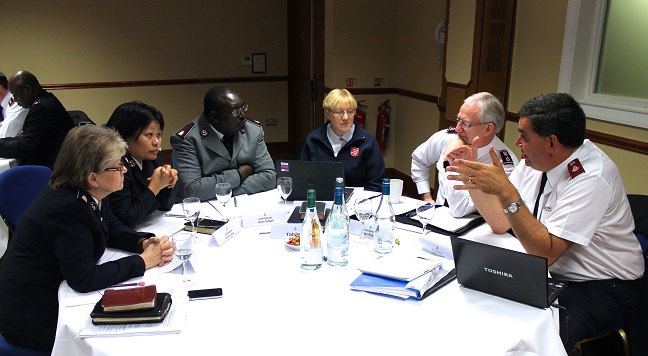Delegates to the 46th meeting of the General's Consultative Council (GCC), under the chairmanship of the Chief of the Staff, Commissioner William A. Roberts, moved to the discussion program of the Accountability and Impact Measurement topics: Child Protection, Finance, Governance and Impact Measurement.
The model used throughout the GCC was that of faith-based facilitation. Delegates were divided into small discussion and working groups, and during the break-out sessions they worked through rigorous questions in preparation for, and in response to, plenary presentations, aided by the support of a group facilitator and recorder. Prior to arriving in London for the GCC, each delegate was required to read and consider detailed papers on each subject, including a theological reflection on the issue.
As the delegates represented the five international Salvation Army zones, so the working groups also reflected the cultural diversity of the worldwide Army. This led to meaningful and important discussions in which the significant and realistic opportunities and challenges of implementing the proposed initiatives across the Army world were shared, with delegates recognising that true reforms within the organisation must start with them.
In keeping with the General's "Accountability Movement," Commissioner William Cochrane, International Secretary to the Chief of the Staff, chaired a "Reminder Presentation," during which the Army's international positional statements on Corruption and The Use of Power were reviewed. The exercise was significant as it gave the international delegates an opportunity to reflect on the importance of these statements and consider how they have been implemented and received within their territories and commands. This presentation aligned seamlessly with the broader discussion topics and was a poignant reminder of the General's personal commitment to accountability.
The GCC delegates understood the significance of their role in this historic journey as The Salvation Army continues to march forward in its 150th anniversary year. It is recognized that, while the end of the GCC marks a significant milestone in the work undertaken to date, more importantly it signals the official start and "next steps" – presentations to the International Management Council at International Headquarters – with the strategic and intentional phased roll-out of specific pilot sites for study purposes, once approvals have been granted. The GCC also recognized that there is much work yet to be completed.
In his closing remarks, the Chief of the Staff thanked delegates for their valued work and participation in this 46th meeting of the General's Consultative Council.
The model used throughout the GCC was that of faith-based facilitation. Delegates were divided into small discussion and working groups, and during the break-out sessions they worked through rigorous questions in preparation for, and in response to, plenary presentations, aided by the support of a group facilitator and recorder. Prior to arriving in London for the GCC, each delegate was required to read and consider detailed papers on each subject, including a theological reflection on the issue.
As the delegates represented the five international Salvation Army zones, so the working groups also reflected the cultural diversity of the worldwide Army. This led to meaningful and important discussions in which the significant and realistic opportunities and challenges of implementing the proposed initiatives across the Army world were shared, with delegates recognising that true reforms within the organisation must start with them.
In keeping with the General's "Accountability Movement," Commissioner William Cochrane, International Secretary to the Chief of the Staff, chaired a "Reminder Presentation," during which the Army's international positional statements on Corruption and The Use of Power were reviewed. The exercise was significant as it gave the international delegates an opportunity to reflect on the importance of these statements and consider how they have been implemented and received within their territories and commands. This presentation aligned seamlessly with the broader discussion topics and was a poignant reminder of the General's personal commitment to accountability.
The GCC delegates understood the significance of their role in this historic journey as The Salvation Army continues to march forward in its 150th anniversary year. It is recognized that, while the end of the GCC marks a significant milestone in the work undertaken to date, more importantly it signals the official start and "next steps" – presentations to the International Management Council at International Headquarters – with the strategic and intentional phased roll-out of specific pilot sites for study purposes, once approvals have been granted. The GCC also recognized that there is much work yet to be completed.
In his closing remarks, the Chief of the Staff thanked delegates for their valued work and participation in this 46th meeting of the General's Consultative Council.










Leave a Comment